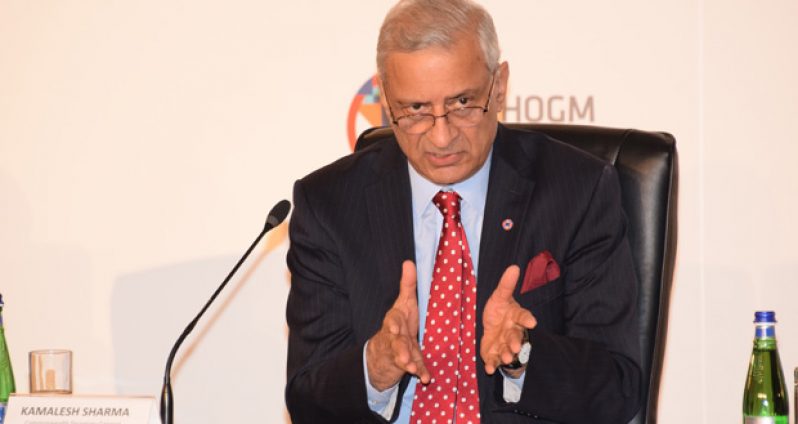By Neil Marks in Malta
THE 53-nation Commonwealth has reaffirmed its commitment to Guyana in the ongoing border controversy with Venezuela following discussions on Saturday.
“We have expressed solidarity as Commonwealth with Guyana on the question of the territorial [controversy] with Venezuela,” Kamalesh Sharma, the Commonwealth Secretary-General said Saturday evening.

The statement of support for Guyana will be included in a communiqué to be issued today at the conclusion of the Heads of Government meeting.
Mr Sharma on a visit to Guyana in July had indicated the Commonwealth’s continued support for this country, and coming to Malta, President David Granger had no doubt that what Guyana was looking for would be achieved.
During a visit to Guyana at the start of July this year, Commonwealth Secretary-General Kamalesh Sharma affirmed the Commonwealth’s solidarity with Guyana and support for the country’s sovereignty and territorial integrity.
“The Commonwealth stands as one and speaks with one voice in our commitment to Guyana’s sovereignty and territorial integrity. We are an association of 53 member states worldwide, accounting for one quarter of the United Nations membership. Commonwealth member governments, individually and collectively, are also committed to the peaceful resolution of disputes and to the rule of law,” Mr Sharma had said in a statement on his arrival in Guyana.
“… I have very close relations with the Foreign Minister, who is a member of the Commonwealth Ministerial Action Group which is the custodian of your core political values in the Commonwealth. Guyana is at the heart of the work we do,” Mr Sharma told Guyanese media following a press conference.
UN Secretary-General Ban Ki-moon was at the meeting on Friday and President Granger used the opportunity “to take our discussions further.”
Helpful
“The Secretary-General has been very engaged over the last three or four months in particular and he has been very helpful. Several teams have come down to Guyana working on his behalf and we are convinced that he is committed to moving the process forward,” the President said.
It was on the eve of Guyana’s independence, some five decades ago that Venezuela claimed that the 1899 arbitral award, which defined the two countries’ borders was null and void.
An agreement signed in Geneva in 1966 provides for the Secretary-General to take action to bring a resolution to the contention by Venezuela.
During an address to the United Nations General Assembly in September, Mr Granger urged the UN to curb Venezuela’s expansionist agenda.
Here in Malta, President Granger said he is looking for the Commonwealth’s solid backing for Guyana, and the group of 53 nations responded in his favour.
Never let down
“The Commonwealth has never let us down and there is no reason to believe that that support will drain away,” Granger stated.
Following recent statements and actions by Venezuela, President Granger had indicated to United Nations Secretary-General Ban Ki-moon that the process of talks has worn out and that it is time for a final legal settlement to Venezuela’s claim that the arbitral award of 1899 which settled the countries’ borders is null and void.
Guyana’s position was laid out when Granger met Mr Ban in the presence of Venezuelan President Nicolas Maduro last September. Since then, the UN has sent two teams to Guyana to move the process further.
Guyana has accused Venezuela of a series of acts of aggression, starting with a Presidential Decree of June 1968. The border controversy flared early this year when American firm Exxon Mobil announced that it had made a “significant” oil discovery.
After threatening the company, Venezuelan President Nicolás Maduro issued a decree on May 26th this year, seeking to extend Venezuela’s land claim, by claiming Guyana’s entire waterfront.
Two years ago, the Venezuelans sent a naval ship into Guyanese waters and seized a U.S.-chartered oil survey ship and escorted it to Margarita Island.
In September, Guyanese authorities also said the Venezuela army was up the Cuyuni River. More recently, late last month, Canada-based mining company Guyana Goldfields reported that it had received an “unfounded” notification of possible legal action by Venezuela over its operations in Guyana.




.png)









